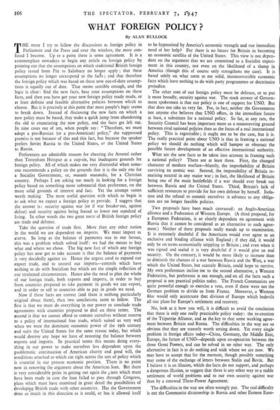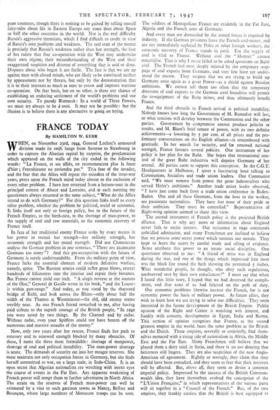WHAT FOREIGN POLICY?
By ALAN BULLOCK
THE more I try to follow the discussions of foreign policy in Parliament and the Press and over the wireless, the more con- fused I become. Up to a point there is some agreement. It is a commonplace nowadays to begin any article on foreign policy by pointing out that the assumptions on which traditional British foreign policy rested from Pitt to Salisbury no longer apply ; that these assumptions no longer correspond to the fads ; and that therefore the foreign policy which was based on these now out-of-date assump- tions is equally out of date. That seems sensible enough, and the logic is clear: find the new facts, base your assumptions on these facts, and then you have got your new foreign policy ready made, or at least definite and feasible alternative policies between which to choose. But it is precisely at this point that most people's logic seems to break down. Instead of discussing the new facts on which a new policy must be based, they make a quick jump from abandoning the old to enunciating the new policy, and the facts get left out. In nine cases out of ten, when people say : "Therefore, we must adopt a pro-Russian (or a pro-American) policy," the suppressed premiss is not because of this and this fact, but because the speaker prefers Soviet Russia to the United States, or the United States to Russia.
Preferences are admirable reasons for cheering the Arsenal rather than Tottenham Hotspur at a cup-tie, but inadequate grounds for foreign policy. All of which makes me very distrustful when some- one recommends a policy on the grounds that it is the only one for a Socialist Government, or, mutatiS mutandis, for a Christian country. Perhaps I am asking too much in looking for a foreign policy based on something more substantial than preference, on the more solid grounds of interest and fact. Yet the attempt seems worth making. The most useful question with which to begin is to ask what we expect a foreign policy to provide. I suggest that the answer is: security against war (or if war breaks out, against defeat) and security against being forced to lower our standard of living. In other words the two great roots of British foreign policy are trade and defence.
Take the question of trade first. More than any other nation In the world we are dependent on imports. We must import or starve. So long as the balance of payments was in our favour, this was a problem which solved itself: we had the means to buy what and where we chose. The big new fact of which any foreign policy has now got to take account is that the balance of payments is very decidedly against us. Hence the urgent need to expand our export trade, and to control our imports—controls which have nothing to do with Socialism but which are the simple reflection of our straitened circumstances. Hence also the need to plan the whole of our foreign trade, both exports and imports, in order to buy from countries prepared to take payment in goods we can export, and in order to sell to countries able to pay in goods we need.
Now if these facts are correct (and there is nothing particularly original about them), then two conclusions seem to follow. The first is that we must do everything in our power to conclude trade agreements with countries prepared to deal on these terms. The second is that we cannot afford to commit ourselves without reserve to a policy of international free trade, which suited us very well when we were the dominant economic power of the 19th century and suits the United States for the same reason today, but which would destroy any hope we have of restoring the balance between exports and imports. In practical terms this means doing every- thing in our power to make ourselves less dependent upon the problematic continuation of American charity and good will, the conditions attached to which cut right across the sort of policy which is essential in our present economic position. There is no point now in renewing the argument about the American loan. But there is very considerable point in getting out again the lans which must have been made in case the loan failed to pass through Congress, plans which must have examined in great detail the possibilities of developing British trade with other countries. Has the Government done as much in this direction as it could, or has it allowed itself to be hypnotised by America's economic strength and our immediate need of her help? For there is no future for Britain in becoming an economic satellite of the United States. This view is not depen- dent on the argument that we are committed to a Socialist eXperi- ment in this country, nor even on the likelihood of a slump in America (though this of course only strengthens my case). It is based solely on what seem to me solid, incontrovertible econemic facts which have nothing to do with party programmes or doctrinaire prejudice.
The other root of our foreign policy must be defence, or to put it more broadly, security against war. The stock answer of Govern- ment spokesmen is that our pOlicy is one of support for UNO. But that does not take us very far. For, in fact, neither the Government nor anyone else believes that UNO offers, in the immediate future at least, a substitute for a national policy. So far, at any rate, the Security Council has been important more as a manoeuvring ground between rival national pogcies than as the focus of a real international policy. This is regrettable ; it ought not to be the case, but it is. The really practical point about UNO is that in framing a national policy we should do nothing which will hamper or obstruct the possible future development of an effective international authority.
What are the new facts to be taken into account in framing such a national policy? There are at least three. First, the changed character of modern warfare—bluntly, the improbability of Britain surviving an atomic war. Second, the impossibility of Britain re- maining neutral in any major war ; in fact, the likelihood of Britain being one of the main battlefields if a war should ever break out between Russia and the United States. Third, Britain's lick of sufficient resources to provide for her own defence by herself. Isola- tion and the refusal to commit ourselves 411 advance to any obliga- tion are no longer feasible policies.
Two proposals have been much canvassed : an Anglo-American alliance and a Federation of Western Europe. (A third proposal, for a European Federation, is so clearly dependent on agreement with Russia that it cannot be considered as an alternative to such agree- ment.) Neither of these proposals really stands up to examination. It is extremely doubtful if the Americans would ever agree to an exclusive and binding alliance with England ; if they did, it would only be on terms economically crippling to Britain ; and even when it was signed and sealed it is very doubtful if it would give us real security. On the contrary, it would be more likely to increase than to diminish the chances of a war between Russia and the West, a war which the United States, but scarcely Britain, could hope to survive. My own preferences incline me to the second alternative, a Western Federation, but preference is not enough, and on all the facts such a proposal is not practical politics today. The French Communists are quite powerful enough to exercise a veto, even if there were not the German problem to divide us from France. Moreover, a Western bloc would only accentuate that division of Europe which bedevils all our plans for Europe's settlement and recovery.
No, look at it how you will, it is difficult to avoid the conclusion that there is only one really practicable policy today: the re-creation of the Tripartite Alliance, and as the key to that some working agree- ment between Britain and Russia. The difficulties in the way are so obvious that they are scarcely worth setting down. Yet every single problem in foreign affairs today—China, Germany, the Middle East, Europe, the future of UNO—depends upon co-operation between the three Great Powers, and can be solved in no other way. The only alternative in fact is to do nothing and stick where we are now. We may have to accept that for the moment, though possibly something may come of the exchange of letters between Stalin and Bevin. But I believe it is an illusion, which the facts do not support, and perhaps a dangerous illusion, to suggest that there is any other way to a stable settlement of world problems and to our own security against war than by a renewed Three-Power Agreement: The difficulties in the way are often wrongly put. The real difficulty is not the Communist dictatorship in Russia and other Eastern Euro-
pean countries, though there is nothing to be gained by telling oneself fairy-tales about life in Eastern Europe any more than about Spain or half the other countries in the world. Nor is the real difficulty Russia's aggressive intentions, which I find difficult to credit in view of Russia's own problems and weakness. The real crux of the matter is precisely that Russia's weakness rather than her strength, the fear of her rulers that free co-operation with the West may undermine their own regime, their misunderstanding of the West and their exaggerated suspicion and distrust of everything that is said or done. Disputes about who began it are futile. The fact is that we are up against men with closed minds, who are likely to be convinced neither by appeasement nor by threats, but only by the demonstration that it is in their interests as much as ours to renew and improve wartime co-operation. On that basis, but on no other, is there any chance of establishing an enduring settlement of the world's problems and our own security. To parody Bismarck: In a world of Three Powers, we must try always to be a trois. It may not be possible: but the illusion is to believe there is any alternative to going on trying.



































 Previous page
Previous page